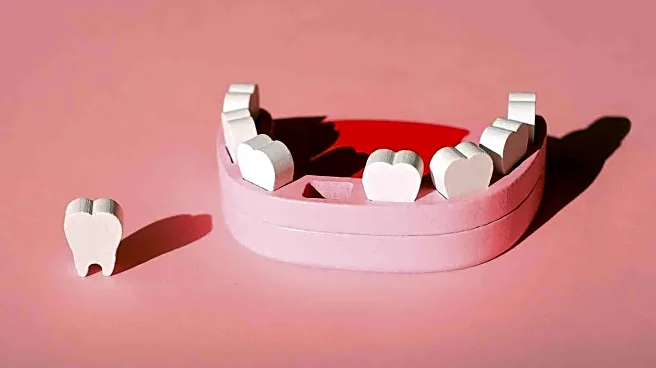What's Happening?
Scientists at the University of Nottingham have created a protein-based gel designed to restore and rebuild tooth enamel, potentially revolutionizing preventive and restorative dental care. This innovative
material mimics the body's natural enamel growth processes, allowing it to repair damaged or eroded enamel and reinforce existing enamel. The gel, which does not contain fluoride, can be applied using traditional dental methods and forms a durable coating that integrates with the tooth surface. It draws calcium and phosphate ions from saliva to promote mineral growth, effectively merging with the natural tooth structure. The research, published in Nature Communications, highlights the gel's ability to treat hypersensitivity and enhance dental restorations by growing an enamel-like layer on exposed dentine.
Why It's Important?
The development of this gel addresses a significant gap in dental care, as enamel does not naturally regenerate once lost. Current treatments only alleviate symptoms without effectively regrowing enamel. Enamel degradation affects nearly 50% of the global population, leading to dental issues that can result in infections, tooth loss, and are linked to conditions like diabetes and cardiovascular disease. The gel's ability to restore enamel structure and strength could significantly reduce these health risks, offering a scalable and versatile solution for various dental problems. This innovation has the potential to improve dental health outcomes for patients worldwide, making it a critical advancement in the field.
What's Next?
The research team, led by Professor Alvaro Mata, is working towards commercializing the technology through their start-up company Mintech-Bio, with plans to release a product by next year. The gel's design prioritizes safety, ease of application, and scalability, making it suitable for widespread clinical use. As the technology is versatile, it could be adapted into multiple products to address different dental issues. The successful commercialization of this gel could lead to its adoption in dental practices globally, providing a new standard for enamel restoration and preventive care.
Beyond the Headlines
This development could shift the paradigm in dental care, emphasizing the importance of biomimetic approaches in medical treatments. The ethical implications of such advancements include ensuring equitable access to new technologies and addressing potential disparities in dental care availability. Long-term, this innovation may inspire further research into biomimetic solutions for other medical challenges, promoting a broader application of nature-inspired technologies in healthcare.









